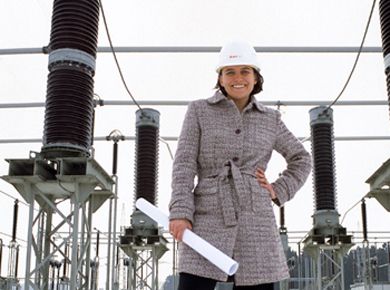Organization of maintenance of electrical equipment of enterprises
The main task of the maintenance of electrical equipment of industrial enterprises is to prevent production downtime due to malfunction of electrical installations, to maintain the correct power quality and will keep the passport parameters of electrical equipment for maximum time with minimum consumption of electrical energy and materials.
When servicing electrical installations, the electrician must monitor the load status of the supply lines and networks, since the loss of electricity in them is proportional to the active resistance of the wires. In order to save electricity, it is recommended, if possible, to include a backup line under load. This significantly reduces line losses. By changing the number of simultaneously operating transformers, it is possible to ensure minimal losses in them.Increasing the average load of the machines reduces the specific energy consumption, and the use of idle limiters on machine tools with an operating time of 10 s or more always results in energy savings. If the average load of the electric motor does not exceed 45% of the rated power, it is always advisable to replace it with a less powerful electric motor.
 In each enterprise, by order (or order) of the administration, a person is appointed from among specially trained electrical personnel (ITR) who is responsible for the general state of operation of all electrical equipment of the enterprise, as a rule, this responsibility is borne by the chief power engineer . The remainder of the utility's electrical personnel is responsible for PTE compliance.
In each enterprise, by order (or order) of the administration, a person is appointed from among specially trained electrical personnel (ITR) who is responsible for the general state of operation of all electrical equipment of the enterprise, as a rule, this responsibility is borne by the chief power engineer . The remainder of the utility's electrical personnel is responsible for PTE compliance.
Without proper electrical personnel operation of electrical installations prohibited.
For the correct and safe operation of electrical installations of workshops and other production areas, together with the chief energy engineer of the enterprise, the power engineers of these workshops and sections and the chief engineer of the enterprise are responsible.
All observed violations of PTE and malfunctions of electrical installations must be reported to your boss, or in his absence, to a higher manager.
 In cases where a malfunction in an electrical installation poses a danger to people around or the installation itself can be repaired by an employee who discovered it, he is obliged to do this immediately and then notify his immediate supervisor about it.
In cases where a malfunction in an electrical installation poses a danger to people around or the installation itself can be repaired by an employee who discovered it, he is obliged to do this immediately and then notify his immediate supervisor about it.
The elimination of the malfunction must be carried out in strict compliance with the safety rules.
Personnel serving electrical installations, before being assigned to independent work or on transfer to another, must undergo industrial training on the job. This also applies to staff who have been out of work for more than 6 months. Classes are conducted by an experienced electrician. After completing the training, a special commission checks the learner's knowledge of PTE and labor safety, work and operation instructions, the technical minimum for equipment maintenance.
 After that, an employee of the operational and operational-repair personnel must undergo an internship as an active employee at the workplace for at least two weeks under the supervision of an experienced employee. This is not required for service personnel.
After that, an employee of the operational and operational-repair personnel must undergo an internship as an active employee at the workplace for at least two weeks under the supervision of an experienced employee. This is not required for service personnel.
Knowledge of PTE and production instructions is periodically checked once every three years, POTR (labor protection rules) — annually, for personnel who directly service existing electrical installations, carry out repairs, electrical installation in them, commissioning or preventive tests, as well as the staff who compile orders and organize these works.
Individuals who have committed a violation of the PTE, POTR, or production instructions are subject to an extraordinary knowledge test.
In the event of an unsatisfactory PTE knowledge assessment, the POTR is re-examined within the time limit set by the committee, but not earlier than two weeks later.
Personnel showing unsatisfactory knowledge during the third inspection are transferred to other work not related to the maintenance of electrical installations.
Each employee who successfully passes the test is issued a certificate with the assignment of a safety qualification group, which gives the right to service electrical installations.
Admission to independent duty or independent work is issued with a special order for the enterprise, workshop, site.
In industrial enterprises, the operation of installations is carried out mainly on the basis of the PPTOR system (System for planned prevention and repair).
The essence of the PPTOR system is that, in addition to the daily care of electrical installations, they undergo regular periodic preventive examinations, checks, tests and various types of repairs.
The PPTOR system allows you to maintain normal technical parameters of electrical installations, partially prevent cases of breakdowns, reduce repair costs, improve technical characteristics during repairs as a result of one or another modernization.
For a repair cycle, the period between two planned major repairs is taken, and for newly commissioned electrical installations, the time of operation from their commissioning to the first planned repair is taken. The sequence of performing different types of repairs and maintenance within a repair cycle is determined by its structure. The repair cycle and its structure are the basis of the PPTOR system and determine all repair standards and economic indicators of the repair system.

